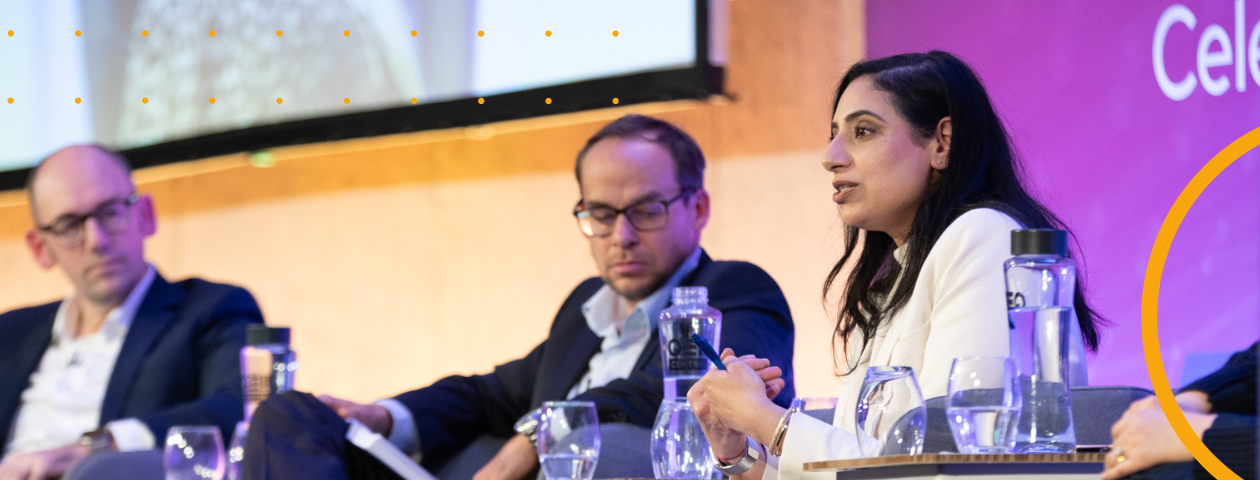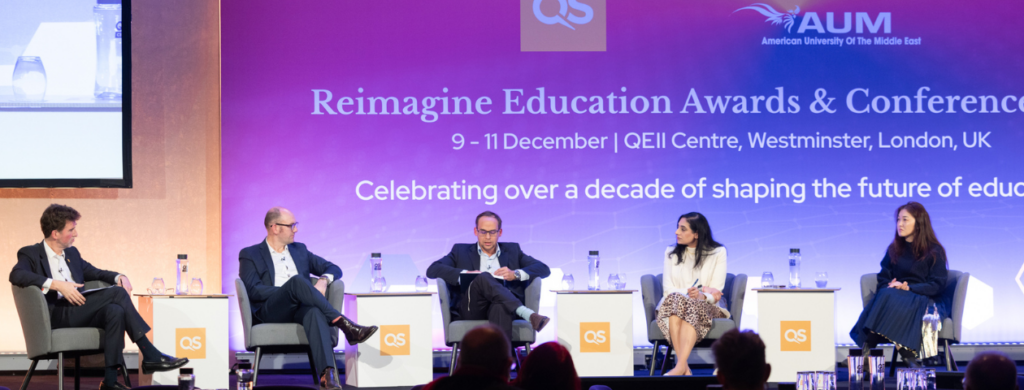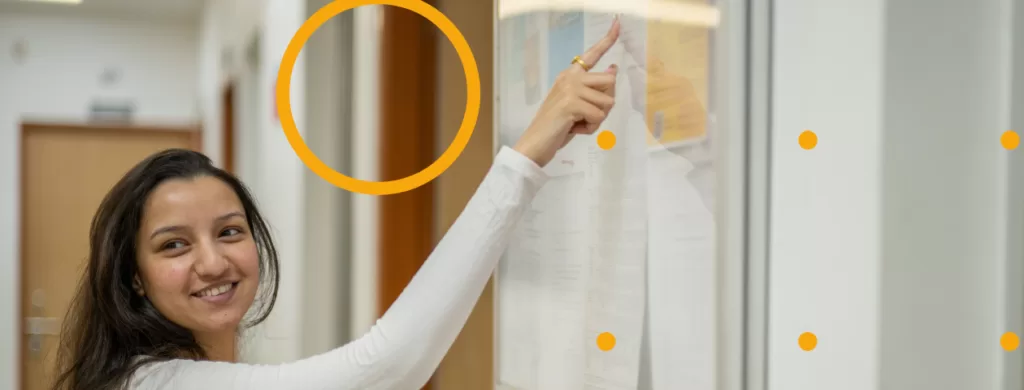
“If we get this right, we have the opportunity not only to address the skills challenge but to lay a strong foundation for an economy that can be more inclusive and responsive.” Yalin Zhao, PwC UK
Today’s workforce requires skillsets that didn’t exist 20 years ago; artificial intelligence (AI), digital and green skills have all come to the fore. The unprecedented pace of technological advancement has accelerated the need for a dynamic response.
The future generation needs new skills, current workers need to upskill or retrain, and governments must collaborate with higher education institutions and industries to enable future economic growth and help this transformation.
Higher education and industry leaders joined forces to explore how universities must adapt to drive skills-led economic transformation at the QS Reimagine Education Awards & Conference 2025 in London, where Patrick Brothers, Founder of HolonIQ and Executive Director at QS, shared that universities are at risk of not being considered as re-skilling partners to industry.
Speaking as a panellist, Brothers said: “The economic transition conversation is dominated by skills, re-skilling and upskilling but there is no assumption that universities are included on the supply side because if you step back from a design perspective and think about the demand problem, the characteristics are that change has to happen fast, it has to be cheap and it has to draw on all forms of the ecosystem and levels of the workforce.
“In one meeting I was in, universities were not considered because they are too expensive, too slow and draw on demographics that are already privileged. We know that universities are incredible engines with respect to talent, so I see an opportunity. The skills economy is there for the taking, but higher education will have itself to blame if it is not ready to seize this opportunity.”
Internal workplace upskilling is shifting the labour market
The internal talent marketplace is growing significantly as employers look to leverage their existing workforce to diversify skills, build career development, and create a more agile workforce. This trend is increasingly driven by the integration of AI systems, which help connect employees with suitable opportunities within the organisation more efficiently (Deloitte).
Yalin Zhao, Senior Manager in skills-based workforce transformation at PwC UK, said: “I’m seeing organisations putting more effort into re-skilling and upskilling and trying to promote more diverse learning and career pathways inside of organisations, making sure their people can continually learn in the organisation’s context.
With that in mind, the key skill needed for the future will be “the ability to continuously develop new skills”, she added. “How can we train students to continuously learn, upskill, reskill and remain relevant in a very different labour market today? That is going to include a growth mindset and strong curiosity to ask ‘what’s changing? How can I adapt?’ These key transferrable skills will be important for every workforce.”
Uzma Khan, Vice Principal for Economic Development and Innovation and Deputy Chief Operating Officer at the University of Glasgow, said: “It’s very difficult to predict the demand for skills due to economic cycles, external competition and policy changes, etcetera. Businesses change to respond to that, so skills forecasting is extremely difficult. So, how do universities stay relevant and capitalise on this skills opportunity? Universities can do that by not only providing the subject-specific skills but thinking about designing a curriculum for life.”
Universities must realise their secret sauce
With free, online content more available than ever – providing new methods for learning via social media, video and AI platforms – higher education has come under scrutiny for its relevancy in an increasingly on-demand world.
According to Brothers, the difference is in the human connection. “A university’s secret sauce is not its content,” he said. “It has to be experiential. Incredible mentors have been one of the greatest things about my own experiences as a student; people who have coached me through learning and helped me have breakthrough moments in my skills and my capabilities.

“We’re buried in our smartphones so much of the time, but a university connects you with peers, with faculty, with mentors – and none of those things can come from burying our faces in technology. The real-life networks and connection we forge, that’s our strength. If that’s the last secret sauce of an institution, to support that intimacy and immersive connection, we need to advance forward in that direction. We’re just still stuck in some very old manifestations of that.”
Frank Wiengarten, Professor in the Department of Operations, Innovation and Data Sciences at Esade Business School, agrees. Speaking on the panel, he said: “If we think about all the innovation happening in the classroom through bringing in guest speakers, in-company projects, real-life case studies, group projects and challenging each other’s thinking – these are the greatest assets that universities have.”
The relevance of universities in civic good is key to economic transformation
While universities should be valued as direct skills providers, the sector also has valuable convening power in the local and regional economies, according to Khan.
“We have the power to understand and listen to what the industries around us need and I think there is an opportunity to look at this ecosystem at a local and regional level,” she said.
The QS World Future Skills Index evaluates how well countries are equipped to meet the evolving demands of the international job market and shows that there is a strong correlation between good economic performance and higher education success.
Khan added, “What makes this really work well is when you’ve got governance structures around your city region or national economy which can provide you with strong intelligence on sector skills and an understanding of how a university can fit into that by supporting or making a relevant contribution to the economy.
“When the University of Glasgow has surveyed employers, most often we have found that they say skills are the biggest constraints to growth, but secondly and increasingly so, they say planning constraints that exist in most economies. When we looked at our data, we found that we could provide a one-year degree in Planning, which is faster than your traditional three-year degree and could make quicker change in that industry. So, it’s about being alive to what’s happening in the world and how to connect directly to local economies.”
This connection also fosters real-world experiences and opportunities for students, who are increasingly looking to study at institutions that stand for the values they believe in and can demonstrate impact. Khan added: “There are so many opportunities for students to support community groups and local economies. Universities must help students to see the wider values of being part of an institution where you have excellent learning, but you also have a role in making a direct contribution to society.”
Moving from the defence to the offence
With the higher education sector facing huge pressures – both locally and globally – the conversation around economic transformation has become defensive, as universities brace themselves against incoming innovation and evolution.
However, “we have to start playing offence and get on the front foot,” said Brothers. “Universities must start engaging with economic development agencies, reaching out more to those leading economic transformation projects.
“I know that’s incredibly difficult and I don’t think we fully appreciate the pressure that is on the Vice-Chancellors, deans and presidents within institutions, but I feel like we need to leapfrog over the hump that is ahead and really get ahead of the curve, or we’re going to be playing defence for the next five-10 years.”
Khan added: “We can’t allow ourselves to be written off by cities or economies which may say that universities are no longer relevant in the transformation space. We are anchor institutions. I often get challenged by our own finance director around the value of having an economic development team in the university, because it doesn’t bring in traditional sources of income, but it’s a mindset change that we need others to make – both internally and externally.”
When asked for their final recommendations for how universities can play a role in economic transformation in 2025, Zhao added: “Demand-driven skills transformation is happening. Be bold. Embrace the change and if we get this right, we have the opportunity not only to address the skills challenge but to lay a strong foundation for an economy that can be more inclusive and responsive.”



